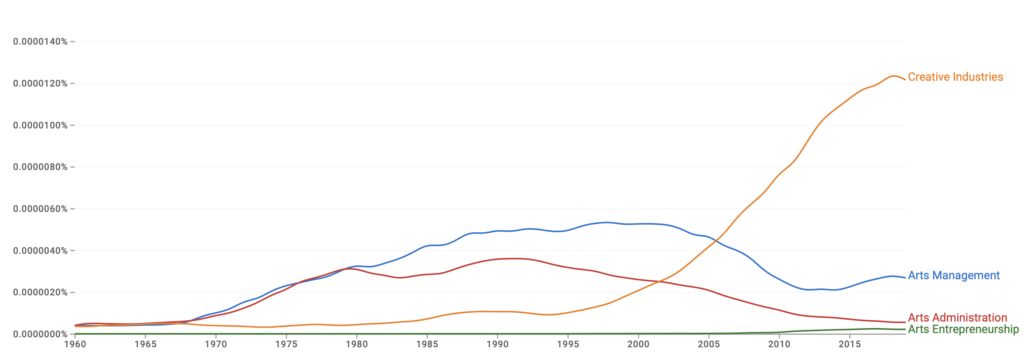The Google Books Ngram Viewer offers an interesting way to track the popularity of a term over time. The service draws from the scanned contents of tens of millions of books encoded by Google. And it can offer a glimpse at the rise (and fall) of phrases, topics, or subjects over two centuries.
A search for the common terms that capture business practice in the arts (Arts Administration, Arts Management, Arts Entrepreneurship) shows a particularly compelling arc. The Ngram (image below) tells a story of three terms that didn’t show up (significantly) until the late-1960s, peaked or plateaued in book references over the following four decades, then waned and wobbled a bit (with Arts Entrepreneurship appearing in trackable numbers around 2010).

It’s easy to overplay the credibility and utility of this chart. The data come from a subset of published materials (only books that have been scanned accurately by Google). A topic could still have a thriving life in discourse outside of that circle. In the context of all scanned text, these terms are dramatically niche (at its peak in 2005, “Arts Management” represented 0.0000035003% of all two-word phrases in the dataset). And both Google Books and Ngram have been criticized for errors and inaccuracies (here, for example).
Still and all, it’s worth interrogating the words we use to describe our work. And, given the dramatic rise of “creative industries” – an adjacent but related term – it’s worth wondering if there’s a world of people doing what I would call “arts management” or “arts administration” but they would not.
At the end of the day, my passion and purpose is to serve and support professionals who work to “aggregate and animate people, money, and stuff toward expressive ends.” And I’m particularly committed to those who do so in and through the plural sector.
If I’m using terms that don’t resonate with people doing that work, I’d love to find the terms that do! What words or phrases should I be exploring? And where would I find pockets of such people who I could learn from and support?
NOTE: I tried several approaches to include “cultural management” or “cultural leadership” in the Ngram, but those phrases are deeply entangled with for-profit organizational cultural management, cross-cultural management, and a range of other meanings that throw the curve.


Love this, Andrew! It’s clear that Google has scanned a lot more material since my article in JAMLS (https://www.tandfonline.com/doi/full/10.1080/10632921.2019.1588817) which began with a similar discussion based on an N-Gram produced by our friend Mark Nerenhausen.
The construction of subject-matter terms, particularly in academe, arises from a host of motivations, from marketing to avoiding those that would offend the defenders of other silos.
Thanks Jim! I’m so glad to have the link to your book review in JAMLS. Somehow I missed it the first time around. And it is interesting how the Ngram looks different for the same years, suggesting that the dataset continues to change even for works published a decade ago.
Ichak Adizes has a great post about the evolution in the business world from Administration to Management to Executive to Leadership. He flags all of them as passing fads that are chasing the idea of an individual (administrator, manager, executive, leader) rather than the necessary collective.
My current concern is less about the second word of “Arts Management” or “Arts Administration” or “Arts Leadership” and more about the first. I am wondering if the falling trend lines in the Ngram suggest a rising number of professionals who wouldn’t use “arts” to describe what they do.
If so, I’m wondering how to find them, extend our circle, and both learn from and serve the similar challenges they face.
Hi Andrew.
Totally agree with your focus of concern on the “Arts” word rather than the second word. I have endless conversations with my students about “what are we talking about when we talk about ‘the arts’?” Are we talking about the “organized arts” the “nonprofit arts” the “institutionalized arts?” And what legitimate art forms are implied OUT of that term like “street art,” “outsider” art or “community-based” art not to mention commercial art that our students very definitely embrace in their world view of “the arts.”
By the same token, I/we are a bit dismayed at the number of people in all kinds of industries who call themselves “creatives” (leading of course to the egregious term “content creators”) which further subsumes the arts into the corporate sphere. At this point, it seems “creative industries” encompasses just about everything (that new photo-sharing app you are developing for example). And don’t get me started on “influencers” who are “curating” their lives for our entertainment.
In a recent class, a student went on a rant about the way that “everyone” is calling themselves an artist these days without investing the work needed to actually be an artist. The rest of the class did not disagree.
Not sure where I come down on this though. It is worth noting, as I read somewhere recently, that biochemists don’t sit around discussing whether someone’s research is “really” biochemistry or not. They just asses the results.
Thanks Ken! Grateful for your insights on this. I agree that it’s like screaming into the wind to decide upon and enforce a boundary for “the arts” as a domain of organizational practice.
My larger focus is to be sure that I use language and lessons that are open enough for a wide array of creatives or makers or artists or culture-bearers to find useful to their work.
If what we call “arts management” or any other term becomes more and more narrow in its recognition and utility, we’re not doing service to those who ARE doing creative work that’s meaningful and impactful.